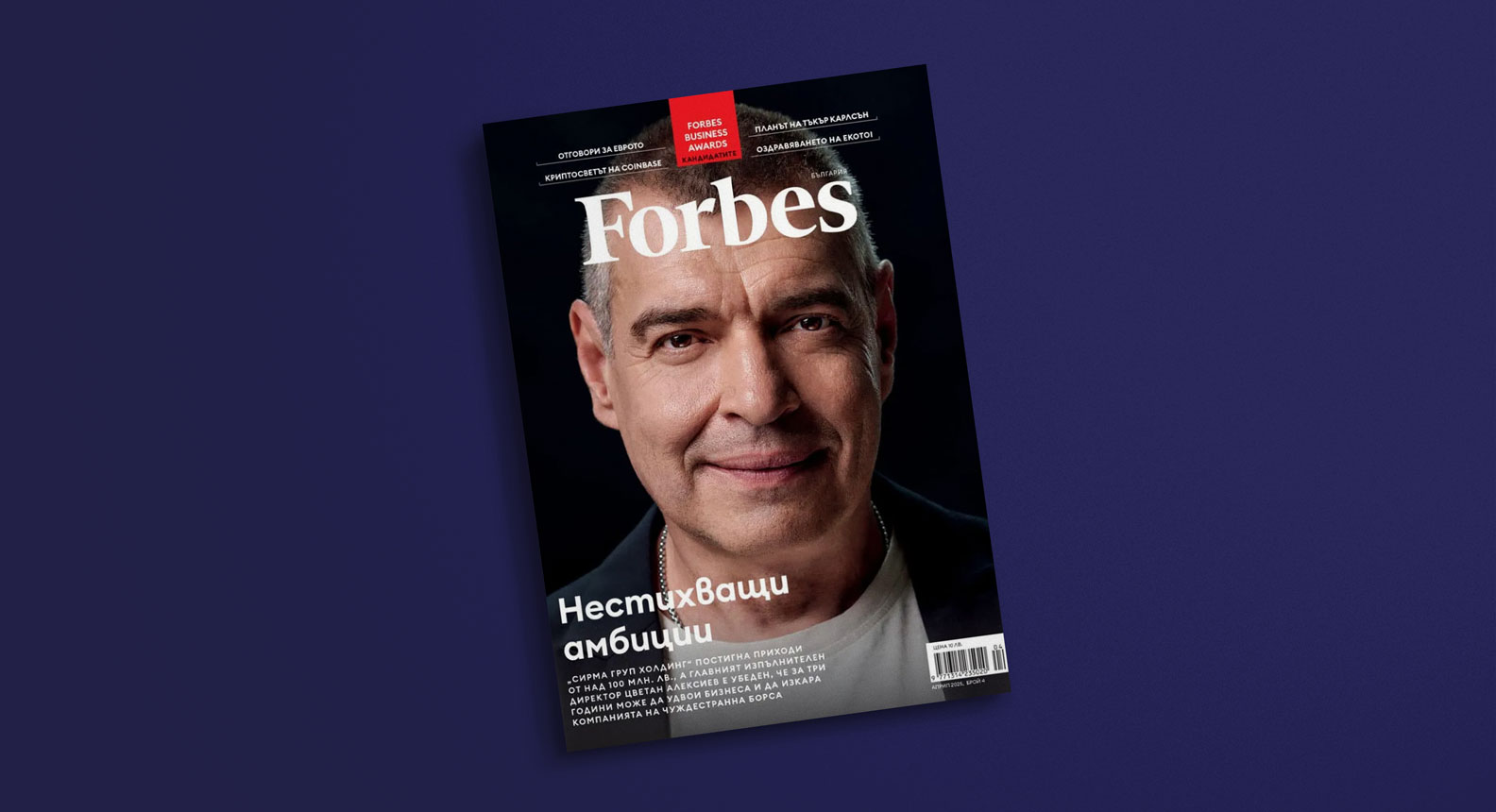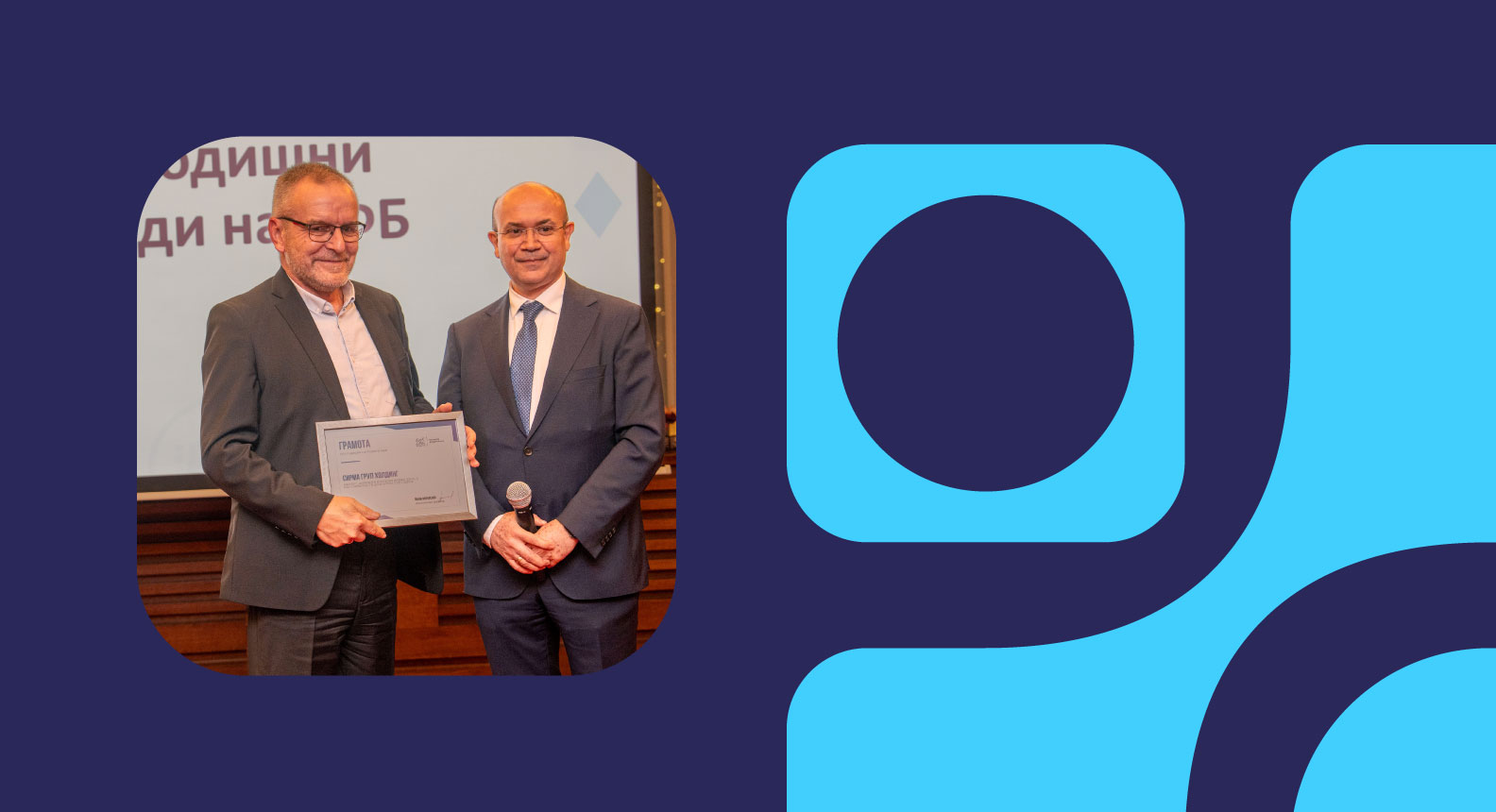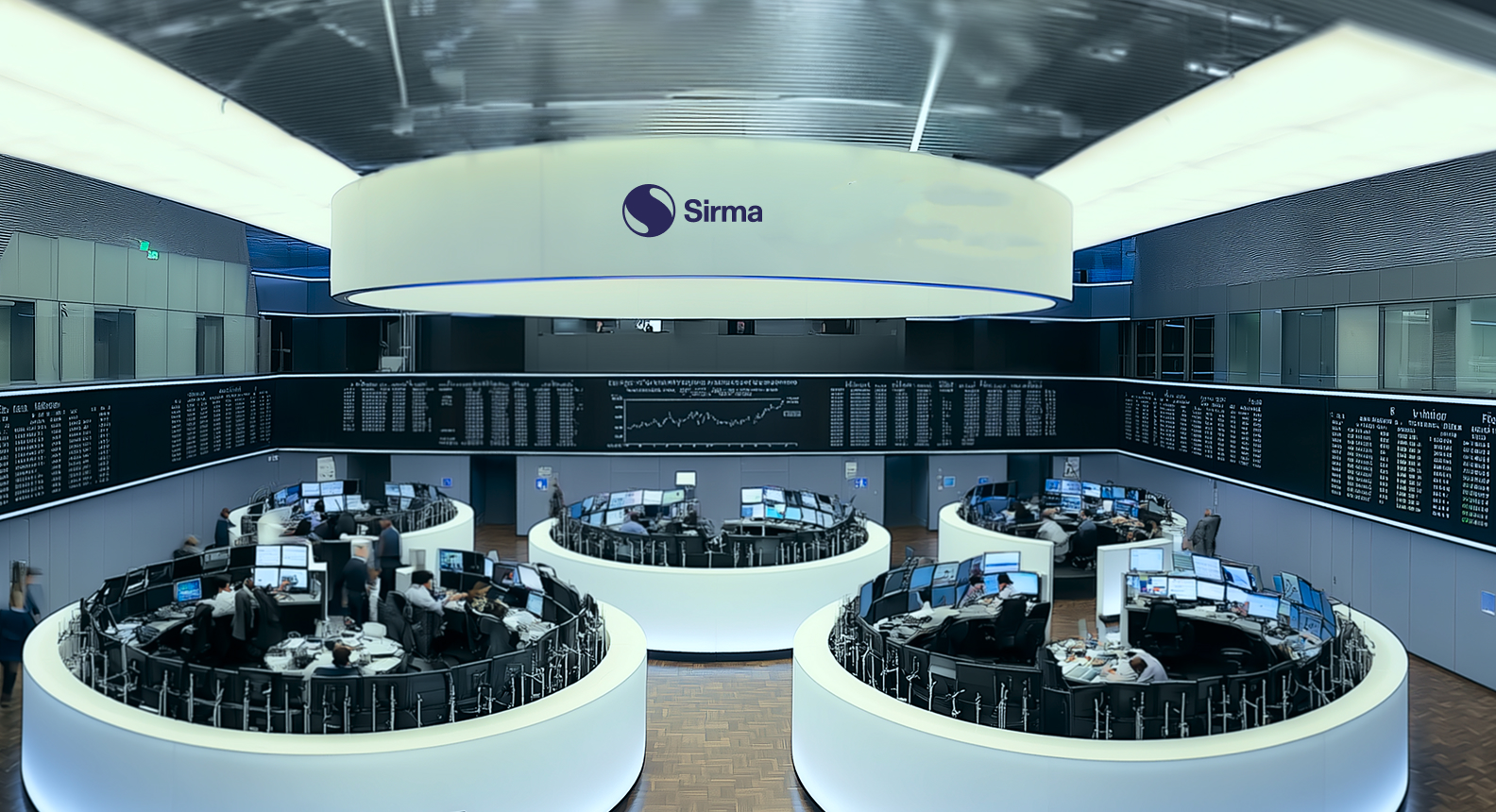Tsvetan Alexiev, CEO of Sirma Group Holding on Sirma’s Path to Doubling Revenue and Global Expansion
In the April issue of Forbes Bulgaria magazine, Tsvetan Alexiev, CEO of Sirma Group Holding JSC, is featured in an interview and on the cover. Here are some key highlights and insights from his discussion about the vision and strategy that will guide Sirma’s growth. This publication coincides with the 33rd anniversary of the company’s founding.
Tsvetan Alexiev shared his perspective on the ongoing corporate restructuring, his expectations for the company’s future, and the current economic environment. He also addressed how Sirma is navigating various economic challenges. Over more than three decades since its inception, Sirma’s development has demonstrated that, regardless of the magnitude of the challenges faced, the company’s management and employees can overcome crises with resilience and emerge stronger. Each year, Sirma consistently ranks among the top ten companies in the Top 100 Bulgarian ICT companies.
Mr. Alexiev, why did Sirma undertake the corporate restructuring?
In the autumn of 2024, we initiated a legal restructuring by merging our subsidiaries under a single brand. Six companies were consolidated into a unified holding structure, and we reorganized the entire group by business lines and verticals. The primary goal of this restructuring is to expand our business, enhance the company’s attractiveness to investors, and prepare for listing on a foreign exchange.
Six months since the consolidation has started, we are already seeing positive changes: our processes are running more smoothly, communication is improving, and the efforts of our sales teams are becoming more synchronised. From my perspective, there is a prevailing sense of optimism, with the expectation that we will complete this process by September 2025. The efforts we made in 2024 have proven to be the right steps, resulting in:
- Revenue growth of approximately 20%, enabling us to surpass the BGN 100 million threshold for the first time while recording a net profit for 2024;
- The acquisition of several companies, with ongoing efforts to seek new M&A opportunities;
- Increasing confidence that we will double our business within three years.
Recently, it was announced that Sirma has begun repurchasing our shares to create a pool aimed at incentivising and rewarding high-performing employees. Our primary objective is to offer attractive rewards to key employees and managers. Our bonus schemes include the opportunity to receive shares and regular remuneration
Outside of financial performance, what was 2024 like for the tech sector?
2024 was challenging for our business due to global economic issues, particularly the stagnation in European markets, where we generate nearly three-quarters of our revenue, and freezing projects in the US. Throughout Europe, few industries fared particularly well. The German economy, often seen as the engine of Europe, has been operating at a reduced capacity for several years, and even the Scandinavian countries faced difficulties. There has been some recovery in the US following Trump’s victory, but recent political developments may influence future trends. Looking ahead to 2025, the global challenges will be even more significant.
Today’s major challenge is integrating artificial intelligence into various business processes, including software development, employee recruitment, and sales call automation. This shift is fundamentally changing how large IT projects are executed. Many large corporations struggle to adapt to these changes because their existing IT projects have not prioritised AI, often due to inertia. Instead, companies are investigating how to use AI effectively. As a result, we see the implementation of conceptual projects and smaller pilot initiatives.
There is no doubt that AI will fundamentally transform the outsourcing industry. This change will be so significant that operating large call centres with thousands of employees may become obsolete. In IT services, we can also expect dramatic changes; however, at this point, language models are still not capable of replacing programmers.
Q1/2025 has passed, and Sirma has reported a strong start. What comes next?
As I previously mentioned, we have achieved record revenues of over BGN 100 million for the first time. I am pleased that Sirma is gaining momentum toward achieving its ambitious goals. We currently have three main priorities:
- Listing on the Frankfurt Stock Exchange
- Continuing our acquisition strategy
- Reaching €100 million in revenue
A key objective is to prepare for a successful listing and public capital raising on the Frankfurt Stock Exchange. We will continue with our acquisitions, representing the inorganic growth component, to reach €100 million in revenue within three years.
My message to everyone at Sirma is that we must roll up our sleeves, mobilise the entire organisation, adapt quickly to new technological realities, and remain at the forefront of technological development.
Let me clarify more regarding the Frankfurt Stock Exchange listing: We want to gain greater recognition for the company because our results are strong, and we believe we are somewhat undervalued on the Bulgarian Stock Exchange. We aim for this recognition to occur in a more mature, liquid, and larger market. Therefore, the logical step is to gather sufficient financial resources to fuel our inorganic growth by acquiring and consolidating more companies. We aim to become a significant, large European IT company with a solid, clear, transparent, and successful structure.
What lessons did you learn from the listing of Sirma’s Bulgarian Stock Exchange (BSE)?
A retrospective look at our IPO in 2015 reveals that by this time, it was the most successful listing of a technology company on the BSE. At that time, the Bulgarian market had not yet recovered from the shock of the 2009 crisis. We never stopped dreaming boldly and set the next goal—to pursue our following listing on an international exchange. In 2019, we attempted to raise capital through the BSE again, but this effort was unsuccessful, and we did not achieve our goal of raising an additional 19.8 million BGN from the exchange. We have consistently worked hard to make the company attractive to investors.
In 2021, we revised our growth strategy and began actively seeking acquisition opportunities. In November 2021, we acquired 80% of Sciant, an IT outsourcing company serving clients in the hospitality, transportation, logistics, and financial sectors. A year later, we acquired TBI Info and completed the purchase of the remaining shares in Sciant. In 2024, we acquired a majority stake in the Romanian company Roweb.
What do investors and investment firms care about strategy, corporate and technology development, and financials?
Investment intermediaries often ask me what types of companies we are looking for and which ones would be a good fit for us. I responded that, first and foremost, the company’s profile should align with Sirma’s verticals of expertise. We have a strong focus on software and services for the financial sector and expertise in insurance, hospitality, transportation and logistics, healthcare, and industrial systems. A prospective company should ideally fall within one of our strategic areas; this way, we don’t have to develop a new vertical for a company. While we are open to entering new industries, the prospect company profile must be compelling. It should be well-positioned, possess interesting technology or extensive project experience, and demonstrate solid and extensive domain know-how that convinces us to establish a new industry vertical within our structure.
We are hesitant to invest in or acquire product companies because they require significant resources. In today’s landscape, a successful IT project demands substantial investment in marketing, business development, sales, and well-trained personnel across various target markets.
Our existing products are used as ready-made solutions for our customers. Thus, we convey to our audience that we are primarily a service company. I recognise that there may be a contradiction between how we are perceived externally and what we actually provide. Over the years, we have created many off-the-shelf technologies and solutions that can be implemented within organisations, yet we do not label them as products. This approach allows us to remain flexible, enhancing and adding value to our offerings. We can also make unique refinements tailored to each organisation while keeping our developments competitive and efficient.
Additionally, any potential acquisition must operate in a market of interest to us; the markets they serve should align with our own so that we can leverage synergies from our global commercial structures. Technological compatibility is also essential; we have to use similar development technologies.
What will be Sirma’s focus in this period you mentioned above?
Our priority across all our business lines is not to achieve aggressive growth but to increase the EBITDA parameter because we are looking pretty good at revenue growth right now. However, restructuring is still having an impact. We have invested in different developments and business ideas, which is always reflected in the EBITDA margin, so we are targeting better results this year.
My expectation is also that after the consolidation of the financial results of Roweb in Sirma’s accounts, there will be another improvement in the figures of the holding company, which may be the entry ticket to the Frankfurt Exchange. The German stock market is not an unattainable goal; we have a successful example with another company that started from Bulgaria (Shelly Group). It began trading there in 2021, five years after its debut on the BSE. I am confident that their success can be repeated. Our positioning on the German stock market will increase Sirma’s visibility within up to two years of listing, changing our global presence.


